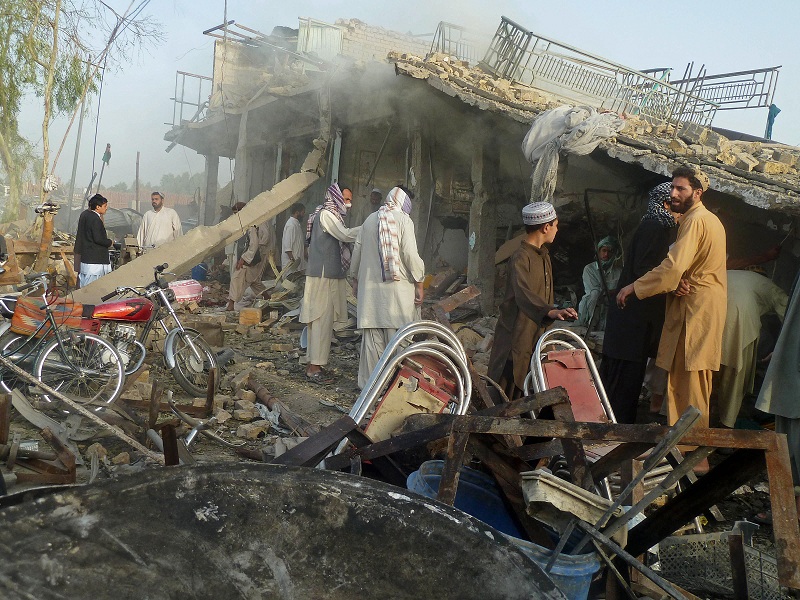By Christophe de Roquefueil / AFP
CAIRO: Egypt’s Hosni Mubarak, who suffered a heart attack on Tuesday while being questioned by prosecutors, enjoyed near absolute power for three decades before being toppled by his own people in February and then called to account.
It was a fall from grace that he found difficult to accept.
State television reported that he had refused to eat or drink after he received news on Tuesday morning that he was to be questioned about the use of deadly force against demonstrators during the 18 straight days of mass protests that forced him from power.
On Monday, in his first statement since his resignation, he told pan-Arab news network Al-Arabiya that he and his family were the victims of “false claims that seek to ruin my reputation and challenge my integrity.”
In a move that angered many Egyptians, he even threatened libel suits against any media reporting the allegations against him. “I reserve my legal rights toward whoever tries to ruin me and my family’s reputation,” he said.
Until the outbreak of anti-government protests on January 25, Mubarak seemed insurmountable as president of the most populous nation in the Arab world, backed by the United States and the military, from whose ranks he had emerged.
Mubarak had survived 10 attempts on his life, and at 82 his health was a subject of speculation. But in the end, it was his people who brought down Egypt’s latter-day pharaoh.
His rise to power came unexpectedly, when his predecessor Anwar Sadat — who made history by signing a peace deal with Israel — was gunned down by Islamist militants on October 6, 1981 at a military parade in Cairo.
He took office a week after the assassination, and since then he ruled without interruption under a draconian emergency law that remains in force.
Islamic fundamentalist groups — including Al-Jihad, Gamaa Islamiyya and Talaeh al-Fatah — were responsible for most of the attempts on Mubarak’s life on both Egyptian and foreign soil.
The first direct attempt to kill him came in 1993, a year after Islamists launched a campaign of violence aimed at toppling the secular Egyptian government, when a bid to fire rockets at his plush Cairo residence was foiled.
Later murder attempts involved a variety of schemes, including a plot to car-bomb the presidential motorcade in Cairo.
In 1995, militants opened fire at the presidential motorcade in Addis Ababa. The previous year saw an attempt to kill him with explosives as he was due to meet Libyan leader Moammar Qaddafi at a military airport.
In September 1999, Mubarak was slightly wounded when a man with no apparent links to any Islamic group stabbed him in Port Said.
Health-wise, Mubarak’s reputation as for vigor — he was once known to play squash
almost daily — was dented in 2003 when he fainted while addressing parliament.
Officials blamed his collapse on a cold and the fact that he had been fasting during the Muslim holy month of Ramadan.
In 2004, he underwent surgery in Germany for a slipped disc, intensifying speculation on potential successors.
He returned to Germany in March 2010 for the removal of his gall bladder and a growth on the small intestine. Rumors that he had died under the surgeon’s knife were quashed when state television showed him recovering.
Mubarak’s health was usually a taboo subject in Egypt and the father of two, whose wife Suzanne is half-Welsh, kept his private life a carefully guarded secret.
In 2007, speculation about his health snowballed to the extent that Mubarak had to make an unscheduled public appearance to lay rumors to rest.
Since his resignation, he has lived with his family at a residence in the Red Sea resort of Sharm el-Sheikh, where he was admitted to the intensive care unit of the international hospital on Tuesday.
The octogenarian, with jet black hair — possibly dyed — and aquiline nose, was born on May 4, 1928 in the Nile Delta village of Menufiya.
He rose through the ranks of the air force and fought in repeated wars with Israel, to claim hero status, before supporting Sadat in pursuing peace with the Jewish state in 1979.
Throughout his years in power, Mubarak maintained the unpopular policy of peace with Israel and accommodation with the West that cost Sadat his life.
His government, overseeing a developing nation of 80 million people, had been the frequent target of domestic opposition — ranging from the Muslim Brotherhood to secular and liberal dissidents.
But the regime quashed militant groups which carried out attacks in the 1980s, the 1990s and, more recently, 2004 and 2006 when the tourism industry was targeted.
His government’s ties with the United States and Israel made him a target of criticism across the region, especially during the 2006 Israel war in Lebanon and Israel’s Gaza offensive in 2008-2009.
Domestic opponents accused Washington of turning a blind eye to human rights abuses, corruption and the Mubarak regime’s failure to push ahead with badly needed reforms.
